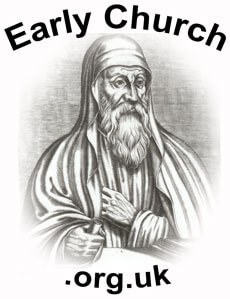Theophilus of Antioch
(Later 2nd Century)
Theology on the Web helps over 2.5 million people every year to find high quality theological resources that will help to equip them to serve God and to know Him better (2 Timothy 2:15). Like other websites that provide free services, it is dependent on donations to enable it to grow and develop and only 0.004% of visitors currently do so. If you would like to support this site, please use one of the options to the right of this message.
Synopsis
Very little is known about Theophilus of Antioch apart from the few autobiographical references in his sole surviving work, To Autolycus. We learn from this that he was converted - apparently as an adult through his personal study of the Scriptures.[1] Eusebius, writing in his History of the Church, named him as the sixth bishop of Antioch in Syria[2] (169-177).[3] To Theophilus belongs the distinction of being not only the founder of Christian biblical chronology,[4] but also that of being the first Christian writer to have produced (a surviving) commentary on the book of Genesis.[5] Because of his interest in both these areas Theophilus’ writings are particularly relevant to our present study.
To Autolycus takes the form of a reply to the objections to Christianity made by an intelligent pagan. Opening Book 1 with a description of God’s character Theophilus puts forward what we would today describe as an argument from design for God’s existence, calling attention to the evident order of the universe.[6] God is invisible, but His existence is demonstrated by what He does. It was through God’s word and wisdom that all things were made.[7] Likewise, it was the Lord who brought Autolycus himself into existence and gave him life.[8] In contrast, the evil deeds of the pagan deities show them up as unworthy of mankinds’ worship.[9]
Theophilus appears to have been familiar with the writings of the major schools of philosophy, if only through secondary sources.[10] Book 2 opens with an attack on idolatry and philosophy, including Plato, Homer, Hesiod and the Epicureans.[11] Despite this open hostility modern scholars acknowledge that Theophilus himself was deeply influenced by Stoicism.[12] Such are his disagreements with the teachings of pagan myths and philosophies concerning the creation of the world that he feels it necessary to set down his own exposition of the text of Genesis. In this he closely followed established Jewish exegesis[13] and his example was followed by many later writers.[14] Theophilus’ interpretation is also distinctly Christian with several distinctly New Testament themes (such as baptism)[15] being read into the text, as well as numerology[16] and several anti-heretical teachings.[17]
Rob Bradshaw, Webmaster
References
[1] Theophilus, Autolycus, 1.14 (ANF, Vol. 2, 93).
[2] According to Eusebius, History, 4.20 (NPNF, 2nd series, Vol. 1, 197).
[3] Frederick W. Norris, "Theophilus of Antioch," EEC, 895.
[4] Marcus Dods, ANF, Vol. 2, 87.
[5] May, 156.
[ 6] Theophilus, Autolycus, 1.5-7 (ANF, Vol. 2, 90-91).
[ 7] Theophilus, Autolycus, 1.7 (ANF, Vol. 2, 91).
[8] Theophilus, Autolycus, 1.8 (ANF, Vol. 2, 91).
[9] Theophilus, Autolycus, 1.9-11 (ANF, Vol. 2, 91-92).
[10] Norris, 895, argues that "Theophilus has a command of rhetoric and a knowledge of Greek philosophy that went beyond cursory handbook reference", while Grant, 149, writes that "in his apology he frequently refers to such authors, though his citations from almost all come from anthologies of poetry and philosophical opinions. He is no student of literature, though he tries to give the impression that he is one."
[ 11] Theophilus, Autolycus, 2.4 (ANF, Vol. 2, 95).
[12] Robert M. Grant, "Theophilus of Antioch to Autolycus," HTR, Vol. 40 (1947): 254; Kathleen E. McVey, "The Use of Stoic Cosmogony in Theophilus of Antioch’s Hexaemeron," Mark S. Burrows & Paul Rorem, eds. Biblical Hermeneutics in Historical Perspective: Studies in Honor of Karlfried Froehlich on His Sixtieth Birthday. (Grand Rapids: Eerdmans, 1991): 32-58.
[ 13] Frend, Rise, 252; Robert M. Grant, Greek Apologists of the Second Century. (Philadelphia: The Westminster Press, 1988), 157-159; May, 163.
[ 14] Jean Daniélou, Gospel Message and Hellenistic Culture. (Philadelphia: Westminster Press, 1980), 390; Grant, Antioch, 227. Those influenced by his exegesis included Eusebius of Caesarea, Methodius, Epiphanius, Procopius of Gaza, John of Damascus, Novation, Lactantius, Jerome and Minusius Felix.
[ 15] Theophilus, Autolycus, 2.24 (ANF, Vol. 2, 101): "On the fifth day… the things proceeding from the waters were blessed by God, that this also might be a sign of men’s being destined to receive repentance and remission of sins, through the water and laver of regeneration, - as many who come to the truth, and are born again, and receive blessing from God."
[ 16] Theophilus, Autolycus, 2.15 (ANF, Vol. 2, 100-101).
[17] Grant, Apologists, 160.
Primary Sources
| Eusebius, Church History 4.20.24. | |
| Jerome. Lives of Illustrius Men 25. | |
| Theophilus of Antioch (Christian Classic Ethereal Library) | |
![Alexander Roberts [1826-1901] & James Donaldson [1831-1915], eds., The Ante-Nicene Fathers, Translations of the Fathers down to A.D. 325, Vol. 2](images/books3/ante-nicene-fathers_vol-02-tb.jpg) Alexander Roberts [1826-1901] & James Donaldson [1831-1915], eds., The Ante-Nicene Fathers, Translations of the Fathers down to A.D. 325, Vol. 2: Fathers of the Second Century: Hermas, Tatian, Athenagoras, Theophilus, and Clement of Alexandria (Entire). Buffalo, NY: The Christian Literature Publishing Company, 1887. Hbk. pp.626. Alexander Roberts [1826-1901] & James Donaldson [1831-1915], eds., The Ante-Nicene Fathers, Translations of the Fathers down to A.D. 325, Vol. 2: Fathers of the Second Century: Hermas, Tatian, Athenagoras, Theophilus, and Clement of Alexandria (Entire). Buffalo, NY: The Christian Literature Publishing Company, 1887. Hbk. pp.626. |
Secondary Sources
Biographies
| Theophilus (F.J. Bacchus) |
Related Subjects
 |
|
 |
|
 |






 David Ivan Rankin, From Clement to Origen. The Social and Historical Context of the Church Fathers. London: Routledge, 2016. ISBN: 9781317132424. pp.182.
David Ivan Rankin, From Clement to Origen. The Social and Historical Context of the Church Fathers. London: Routledge, 2016. ISBN: 9781317132424. pp.182.


